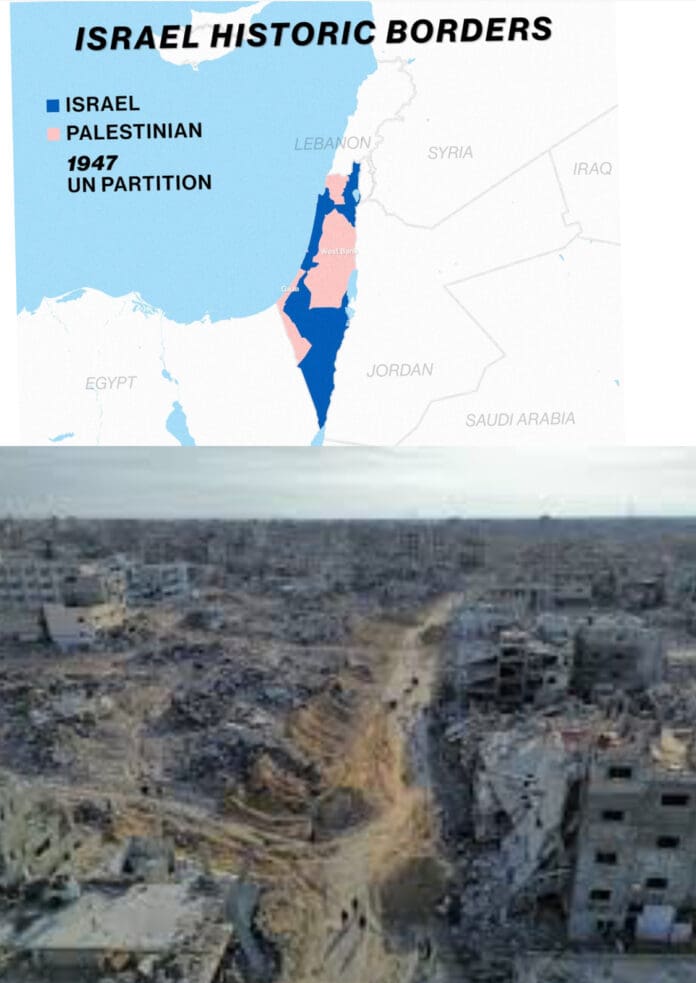Before we get deep, there are still those who believe that the Israeli war crimes are entirely down to Hamas’ ‘assault on October 7, 2023. Let us please put that to bed.
The Double Standard at the Heart of ‘Humanitarianism‘
Liberal humanitarianism promised a new era of moral clarity. From Kosovo to Libya, Western leaders claimed that sovereignty could no longer protect states engaged in mass atrocities. The Responsibility to Protect (R2P) was hailed as universal, impartial, and rooted in the shared conviction that “never again” would the world stand idle in the face of crimes against humanity.
And yet, when it comes to Israel, those same principles evaporate. Across Gaza and the West Bank, evidence of systemic abuses, including collective punishment, apartheid, and indiscriminate violence, has been documented by Amnesty International, Human Rights Watch, and multiple UN agencies. By the very standards used to justify past interventions, Israel qualifies for the same measures once imposed on others. But rather than sanctions or force, it receives military aid and diplomatic protection.
The following examines that contradiction. Drawing on political theory, historical case comparisons, and pragmatic considerations, it argues that the West’s selectivity undermines the moral credibility of humanitarianism itself.
1. The Moral and Legal Foundations of Humanitarian Intervention
The justification for intervention has evolved through two intellectual traditions:
- Moral Philosophy: Just war theorists such as Walzer (2006) define intervention as permissible to stop “acts that shock the moral conscience of mankind,” provided criteria like proportionality and reasonable success are met. Rawls (1999) allows coercion against “outlaw states,” while Habermas (2010) insists that norms gain legitimacy only when applied universally.
- Legal Norms: Codified through the International Commission on Intervention and State Sovereignty (ICISS, 2001) and endorsed at the 2005 UN World Summit, R2P obligates the international community to act when a state “manifestly fails” to protect its population from genocide, war crimes, ethnic cleansing, or crimes against humanity.
The promise was universal application. The practice has been anything but.
2. Case Comparisons: How the West Applies R2P
Intervention has typically been justified on four criteria: mass atrocities, state unwillingness to prevent them, exhaustion of peaceful measures, and reasonable prospects of success. A comparison of key cases reveals striking inconsistencies.
Table 1: Atrocities and Responses Under R2P
| Case | Estimated Civilian Deaths (Pre-Intervention) | Displacement | Type of Atrocity | Western Response |
|---|---|---|---|---|
| Kosovo 1999 | 1,500–2,000 | 200,000+ | Ethnic cleansing | NATO military intervention |
| Libya 2011 | Several hundred–few thousand | 100,000+ | Imminent mass killing | UN-authorised airstrikes |
| Rwanda 1994 | 800,000+ | 2 million+ | Genocide | No intervention (failure) |
| Darfur 2003 | 200,000–300,000 | 2.5 million+ | Crimes against humanity | Sanctions, ICC indictments |
| Myanmar 2017 | 25,000+ | 700,000+ | Ethnic cleansing | Sanctions, ICC investigations |
| Israel-Palestine (Ongoing) | Thousands per major offensive (e.g., 2014, 2021, 2023) | Millions affected | Apartheid, war crimes | Military aid, diplomatic shielding |
In Kosovo and Libya, far smaller death tolls were deemed sufficient for coercive action. In Rwanda and Darfur, the atrocities spurred global soul-searching and institutional reforms, even if imperfectly enforced. Myanmar demonstrates that non-military measures, sanctions, arms embargoes, and ICC referrals can be mobilised against systemic persecution.
By these same metrics, Israel’s conduct meets or exceeds the thresholds for humanitarian response, yet enjoys near-total immunity from comparable measures.
3. Why the Difference? The Geopolitics of Selectivity
Several factors explain this exceptionality:
- Alliance Structures: Israel is a core Western ally with military and intelligence ties that Kosovo, Libya, or Myanmar never enjoyed.
- Power Asymmetry: Unlike targeted states in prior interventions, Israel possesses advanced military capabilities and nuclear ambiguity, making coercion far riskier.
- Lobbying and Domestic Politics: US and European political landscapes constrain policymakers in ways absent in cases like Darfur or Libya (Mearsheimer & Walt, 2007).
- Narratives of Legitimacy: Western discourse frames Israel as a democracy under threat, allowing actions to be rationalised as security measures rather than atrocities.
These dynamics reveal what Orford (2011) calls the “managerial function” of humanitarianism: norms are universal in theory but instrumentalised in practice.
4. Consistency Without Catastrophe
Universalising humanitarian principles does not necessitate replicating past military interventions. Walzer’s proportionality criterion suggests that attacking Israel could worsen human suffering and destabilise the region.
However, equally serious non-military measures could restore credibility to humanitarian norms:
- Comprehensive sanctions and arms embargoes, as applied to apartheid South Africa.
- ICC referrals for alleged crimes against humanity.
- Diplomatic isolation until compliance with international law.
Such measures, deployed against Myanmar and Darfur, illustrate that meaningful action is possible without catastrophic escalation.
5. Salvaging Humanitarianism
The selective application of R2P has hollowed out its moral authority. If Israel’s conduct qualifies under the same criteria used to justify past interventions, yet Western powers refuse to contemplate equivalent measures, humanitarianism ceases to be a universal ethic and becomes an exercise in power.
As Rawls (1999) warns, “a law of peoples that exempts the powerful corrodes its own foundations.” To preserve humanitarianism as a meaningful project, the West must either abandon the pretence of universality or confront the uncomfortable task of applying its principles impartially, even to its closest allies.







